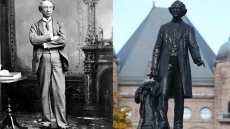OTTAWA — The number of irregular border crossers in Canada went up in July after two months of decline.
Newly published federal data shows a total of 1,634 irregular migrants were apprehended by RCMP between official border crossings last month.
That's 371 more than the number of people who crossed irregularly into Canada in June.
The numbers had been slowly decreasing since May — a downward trend the federal government had attributed to its outreach efforts as it continues to try to send the message that crossing the Canada-U.S. border at non-official entry points is not a free ticket into Canada.
Despite last month's increase, the monthly totals are still lower than those in March and April and represent half the number of people who arrived in July of last year.
"While these (latest) numbers are promising, Canadians expect all levels of government to work together to live up to our international and humanitarian obligations," said Mathieu Genest, spokesperson for Immigration Minister Ahmed Hussen.
The issue of irregular border crossers has been an ongoing headache for the Trudeau government, with concerns being raised by officials in Quebec and Ontario about millions in unanticipated costs incurred from the vast majority of asylum seekers seeking housing, social assistance and schooling in Montreal and Toronto as they await the outcome of their refugee claims.
Ottawa has responded to the influx with an increase in spending of $173 million for improved border security, temporary housing and to help address a major backlog in refugee claims processing at the Immigration and Refugee Board.
Genest said further efforts are underway to establish a "triage system" to encourage some asylum seekers to settle in towns and cities outside of Montreal and Toronto.
"Our plan is to have a triage system in place in the coming weeks to allow us to better manage the flow of asylum seekers to different municipalities."
The surge in irregular migrants to Canada began in 2017, shortly after the United States announced plans to withdraw temporary protected status for individuals living in the U.S. from certain countries, including Haiti and El Salvador.
Last year, the majority of irregular migrants to Canada were originally from Haiti, but this year the majority are Nigerian, with many arriving in Canada from the U.S. after obtaining U.S. travel visas.
So far this year, a total of 12,378 individuals have filed asylum claims after entering Canada irregularly.




